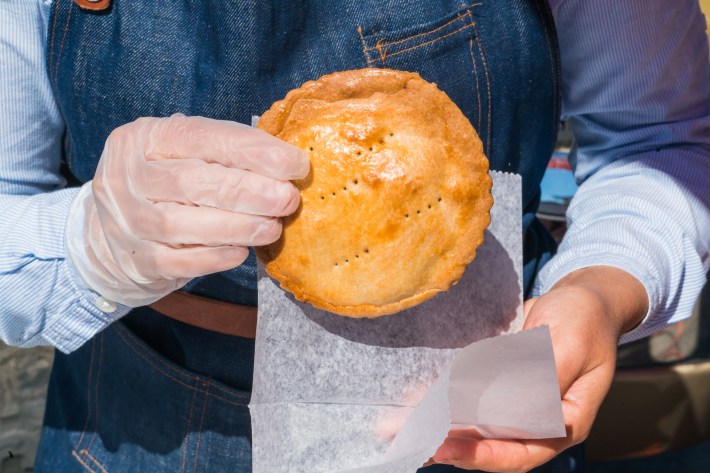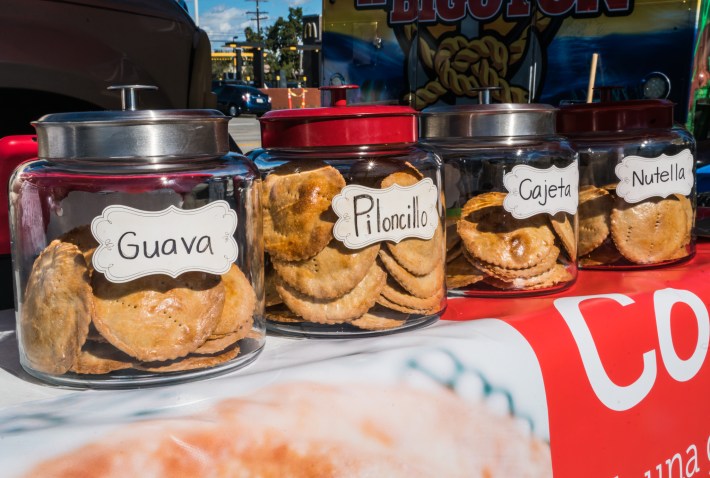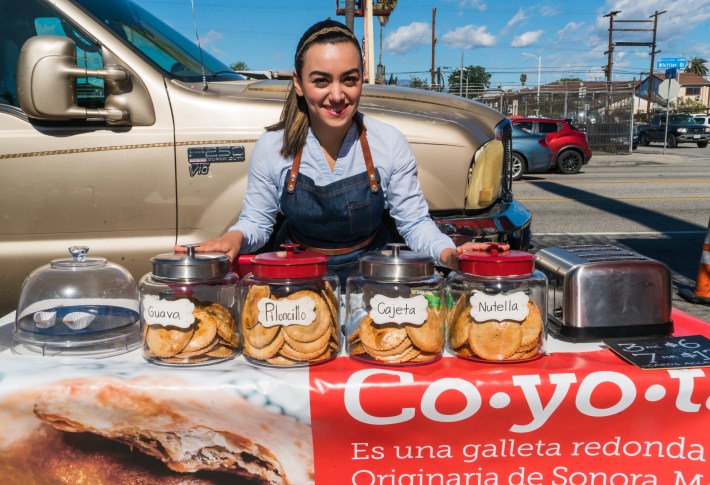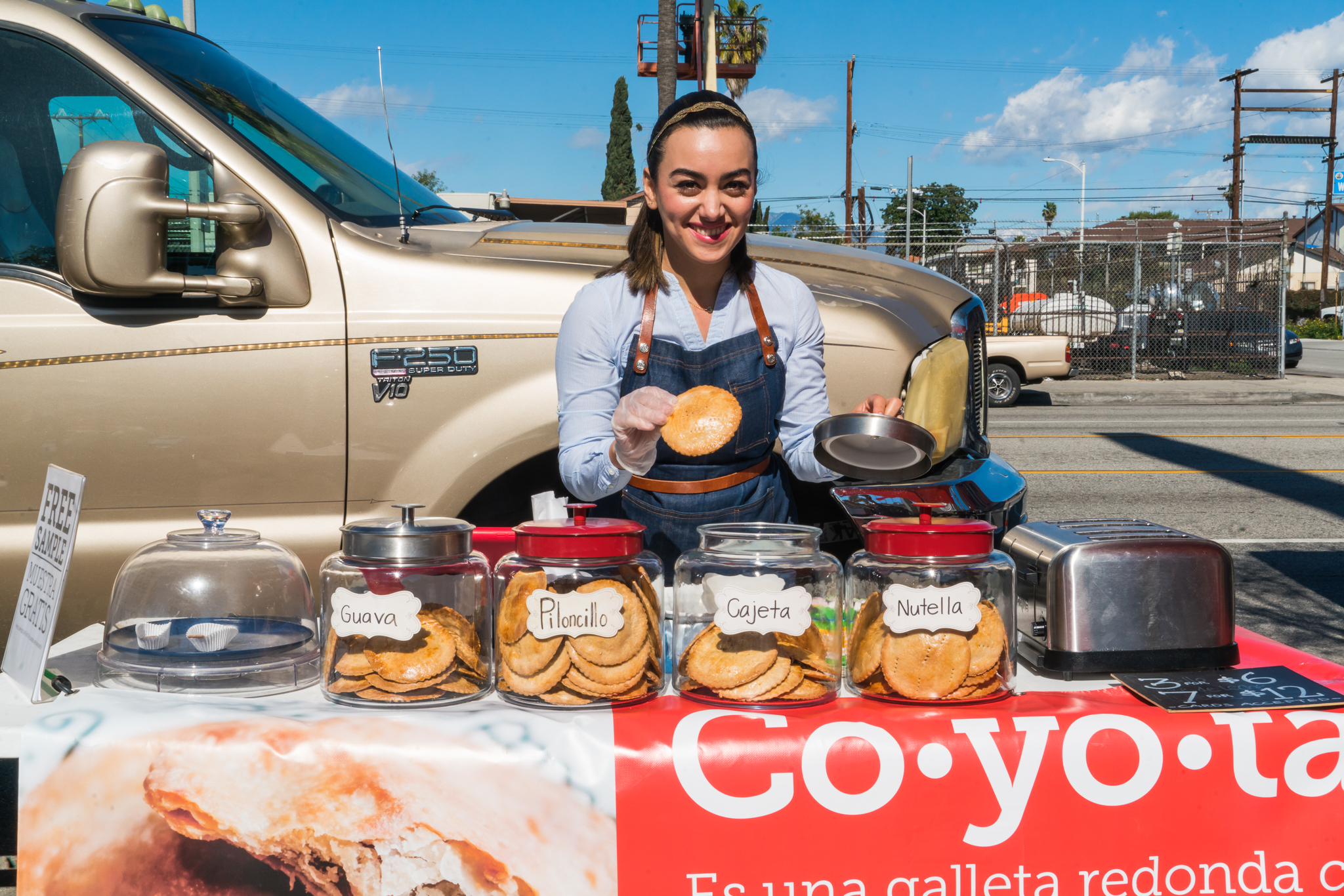[dropcap size=big]I[/dropcap]n a city known for its bold, diversified culinary scene, a new dessert is representing Mexico in the streets of L.A. after making the 700-mile journey from the Sonoran desert — the coyota.
Coyotas are the very essence of Sonora. They are a staple of the northern Mexican state made from flour-based dough and filled with various sweet fillings – like cajeta, panocha (also known as piloncillo or brown sugar cane cones) and guava – and baked to a tender crisp.
It is said the name originated from the time when mestizo girls sold the dessert and were dubbed with the name coyotas. These Sonoran delights have been a well-kept secret, only enjoyed by those of us all too familiar with the dry, hot region represented by Sonora. For most non-natives, the border state in northern Mexico is stereotypically famous for narcos and flour tortillas.
When Marisela Parada, a former biochemist from Sonora, first starting selling coyotas with her husband Juan in L.A., she never imagined it would emerge a success. After just four months, they started Coyotas de Sonora a thriving Mexican pastry stand in East L.A.

What Are Coyotas?
[dropcap size=big]I[/dropcap]t’s a cold, windy day in East L.A.’s Vendor Row where food trucks and stands line the sidewalks filled with hungry patrons. Among them is a stand with a sign that reads “coyotas,” but to curious L.A. residents and tourists alike, this word is usually unknown.
Struggling to find a way to describe her handmade desserts, Parada lands on the best possible description for a curious customer: “They’re like empanadas and cookies.”
She will tell you that her creations are more of a crossover of the two, or as she puts it, “They’re like a Mexican Pop-Tart because you can toast it or you can eat it as is.” This helpful explanation paints a familiar image to those unfamiliar with the dessert.
RELATED: This Old School Panaderia in Highland Park Is Making L.A.'s First Vegan Pan Dulce

The coyota is flaky, but in a good way. It's the type of flaky that crumbles as soon as the crisply baked dough enters your mouth and your taste buds are exposed to the sweet filling made from cajeta, piloncillo and others like Nutella and mazapan.
What makes the coyotas all the more appealing to hungry Angelenos is their quality, as they are handmade and vegan, with the exception of those with dairy based fillings. Selling at $2 per coyota, Parada goes above and beyond to make her coyotas with 100 percent authentic Mexican ingredients, the same products used by her family in Navojoa, Sonora.
Parada says her biggest struggle lies in the product’s name. Since the word is closely tied with implications of coyotes – smugglers who cross migrants into the U.S. “We have to joke with the name when we talk to the customers to get them to try the product. Sometimes we have to say we’re selling coyotas to pay for the coyote,” Parada says.
“We thought about changing the name in the beginning," Parada recalls. "But I said to my husband, ‘How am I going to change the name of something that’s been there since Spaniards colonized Sonora!’ It’s like changing the name of a taco. A coyota will always be a coyota.”
RELATED: Support Stories Like These, Get Free Tacos

In the Lab
[dropcap size=big]I[/dropcap]n Sonora, coyotas can be a hit or miss, especially among big brands. Every commercial coyota maker in Sonora adds their own twist to the dessert as “every family has its own version,” Parada explains. “Lulu, Doña Maria, and Coyotas Mozas are three of the most commercialized coyotas in Sonora.”
However, the major difference between the big brands is their way of baking and filling – and of course, their prices. “They’re expensive and have way too much filling and sugar,” Parada says.
For Parada, Making coyotas is filled with the intensity and precision of a Shakespearean drama. There’s the riveting moments of whether or not the dough will mix and rise properly due to the different climate and altitude that differ from country to country. Then there’s an extensive internal monologue Parada is faced with while choosing the perfect piloncillo at the grocery store to turn into filling.
Baking runs in her blood. The coyota recipe can be traced back for decades in her family. She has to carefully remember her family’s tips because not every piloncillo is adequate for coyotas. And there’s the anxiety she feels assembling the coyota with the right amount of filling as to not overload the customer’s palate.
What emerges from the oven is a perfectly toasted, golden brown concoction filled with just the right amount of sweetness to be enjoyed with a hot cup of coffee, per Parada’s orders. It doesn’t get more Sonoran than coyotas and a freshly brewed, hot coffee.

From the tender age of seven, Parada began baking in her childhood home in Navoja, learning her family’s coyota and flour tortilla recipes. She made pies, she made cakes, she made coyotas. She made and sold her creations to her peers and professors at school. Yet, following her father’s footsteps, she pursued a degree in the medical field and became a biochemist, putting aside her gifted baking. She ran her father’s lab, where she became enthralled with the world of science and health.
Flour, dough, and sweet fillings have now replaced beakers, microscopes, and test results. Parada traded in her latex gloves for oven mitts and turned her kitchen into her new lab. A place where she perfected her family’s coyotas – a recipe that dubbed her family the best coyota makers in Navojoa.
“My plan was to never sell coyotas here. My plan was to revalidate my degree to be able to work in my profession,” Parada explains.
But she wears the title of baker with pride. “How am I not going to have love towards a product that I saw since my childhood. Something that you know is yours. Something that captivates my country and my state. That’s where I’m from. That’s where I was raised.”
RELATED: This Viral Donut Shop in Downey Is Doing Bionico, Mazapan, and Selena-Inspired Donuts
Coyotas de Sonora is located in East L.A. at 5505 Whittier Blvd from 11 am to 6 pm on Saturday’s and Sunday’s and at La Puente Live Farmers’ Market.







